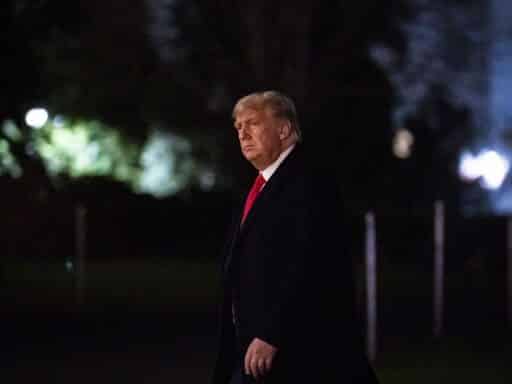Trump’s pardons continue his use of presidential powers to benefit his friends and allies.
President Donald Trump on Tuesday announced a flurry of pardons and commutations — largely to a mix of political cronies and allies, from people caught in former special counsel Robert Mueller’s Russia investigation to corrupt ex-members of Congress.
Among the pardons are former Trump campaign aide George Papadopoulos and Dutch lawyer Alex van der Zwaan, both of whom were caught in the Russia investigation. They also include former Republican Congress members Chris Collins of New York, Duncan Hunter of California, and Steve Stockman of Texas, each of whom pleaded guilty to or was convicted of corruption charges.
Trump also pardoned four men who, working as private military contractors with the firm Blackwater, participated in a massacre of Iraqi civilians in 2007, as well as two Border Patrol agents who in 2006 killed an unarmed, undocumented immigrant. (Former President George W. Bush had commuted, but not pardoned, the sentences of the Border Patrol agents.)
Nonviolent drug offenders recommended by Alice Johnson, who was granted a reprieve from her own drug-related conviction in 2018 following intense lobbying by Kim Kardashian, were also included in the pardon and commutation blitz.
The wave of forgiveness is potentially only the beginning of the pardons and commutations Trump may issue as his time in the White House comes to an end. This most recent wave, the White House acknowledged, came under the recommendation of conservative media and members of Congress.
According to the New York Times, Trump’s move also appeared to bypass the usual process that involves review by the Department of Justice.
The president has used his pardon powers to the benefit of political allies before. He recently pardoned his former national security adviser, Michael Flynn. Prior to that, Trump granted reprieves to adviser Roger Stone and former Maricopa County, Arizona, Sheriff Joe Arpaio, who endorsed and campaigned for Trump.
Harvard professor Jack Goldsmith estimated 88 percent of Trump’s pardons and commutations have gone to people with personal or political ties to Trump. The latest pardons “continue Trump’s unprecedented pattern of issuing self-serving pardons and commutations that advance his personal interests, reward friends, seek retribution against enemies, or gratify political constituencies,” Goldsmith told the Times.
The president’s pardon powers are nearly limitless and face almost no constraints, letting the person in the Oval Office grant nearly unchecked relief for anyone facing or convicted of federal charges.
Past presidents have also used their pardon powers for friends and allies. Former President Bill Clinton triggered controversy when he issued more than 100 pardons on his last day in office, including to his half-brother and to Marc Rich, whose ex-wife was a Clinton donor.
These longstanding problems have led some activists to call for reform of the pardon process, fashioning it to be less a tool of political and personal favors and instead a means to criminal justice reform.
For example, during their presidential campaigns, Sens. Amy Klobuchar (D-MN) and Cory Booker (D-NJ) separately proposed establishing independent boards, made up of a variety of stakeholders throughout the criminal justice system, who would advise the president on his or her use of the pardon powers. The focus would be to empty federal jails and prisons of people charged for low-level offenses — or perhaps others who simply face sentences that are too harsh relative to the crime.
President-elect Joe Biden seems receptive to such measures, although his own plans for the president’s pardon powers are vague so far.
Trump, however, wasn’t receptive to such reforms, continuing to use his powers in a way that benefits his friends and allies rather than institutes broader reforms. Tuesday’s latest wave of pardons only affirms that.
Author: German Lopez
Read More



